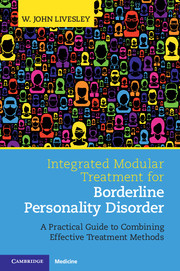 Integrated Modular Treatment for Borderline Personality Disorder
Integrated Modular Treatment for Borderline Personality Disorder Book contents
- Frontmatter
- Dedication
- Contents
- Preface
- Section 1 Introduction and Framework for Understanding Borderline Personality Disorder
- Section 2 Assessment and Treatment Planning
- Section 3 General Treatment Modules
- Section 4 Safety, Containment, and Engagement: The Initial Phase of Treatment
- Section 5 Improving Emotional Regulation and Modulation
- Section 6 Exploration and Change: Treating Interpersonal Problems
- Introduction
- 18 Principles for Treating Maladaptive Schemas and Interpersonal Patterns
- 19 Treating Submissiveness
- 20 Working with the Core Interpersonal Conflict
- Section 7 Constructing an Adaptive Sense of Self
- Section 8 Retrospect and Prospect
- References
- Index
19 - Treating Submissiveness
from Section 6 - Exploration and Change: Treating Interpersonal Problems
Published online by Cambridge University Press: 16 February 2017
- Frontmatter
- Dedication
- Contents
- Preface
- Section 1 Introduction and Framework for Understanding Borderline Personality Disorder
- Section 2 Assessment and Treatment Planning
- Section 3 General Treatment Modules
- Section 4 Safety, Containment, and Engagement: The Initial Phase of Treatment
- Section 5 Improving Emotional Regulation and Modulation
- Section 6 Exploration and Change: Treating Interpersonal Problems
- Introduction
- 18 Principles for Treating Maladaptive Schemas and Interpersonal Patterns
- 19 Treating Submissiveness
- 20 Working with the Core Interpersonal Conflict
- Section 7 Constructing an Adaptive Sense of Self
- Section 8 Retrospect and Prospect
- References
- Index
Summary
Discussion of the treatment of specific interpersonal impairments begins with submissiveness because it is often easier to treat than other interpersonal problems. The behaviours and schemas involved are simpler and their exploration does not activate emotional distress to the same degree.
The Nature of Submissiveness
Maladaptive manifestations of submissiveness include three broad sets of behaviour: subservience, suggestibility, and the need for advice and reassurance. The latter is linked to strong dependency needs that are discussed in the next chapter. The more specific behavioural manifestations of the trait include indiscriminately acceding to others’ demands, always deferring to others, placating and appeasing others, consistently seeking to please others, accepting other people's opinions readily, difficulty expressing personal needs, problems voicing one's own opinion, discounting one's own opinions, allowing others to be excessively critical and abusive, being exploited and taken for granted, having difficulty in being assertive, putting others’ needs first, putting one's self down, and needing constant advice and reassurance. Some common schemas associated with the trait are listed in Box 19.1. Submissiveness increases vulnerability to abuse and exploitation: all too often these patients go from one abusive relationship to another. This was the case with Anna. In her late teens and early adulthood, she had a series of relationships with emotionally abusive and sometimes physically abusive men. She wryly observed that there was little point in leaving her current marriage because she would only end up with someone similar and sometimes it was best to stick with the devil you knew.
The Origins of Submissiveness
In Chapter 3, it was noted that there is often a discrepancy between patients’ overt behaviour and their inner experience. This is frequently the case with submissive individuals with borderline personality disorder (BPD); they present an angry demanding facade that often leads observers to miss their more submissive features and not recognize their inner uncertainty and vulnerability.
- Type
- Chapter
- Information
- Integrated Modular Treatment for Borderline Personality DisorderA Practical Guide to Combining Effective Treatment Methods, pp. 204 - 212Publisher: Cambridge University PressPrint publication year: 2017


